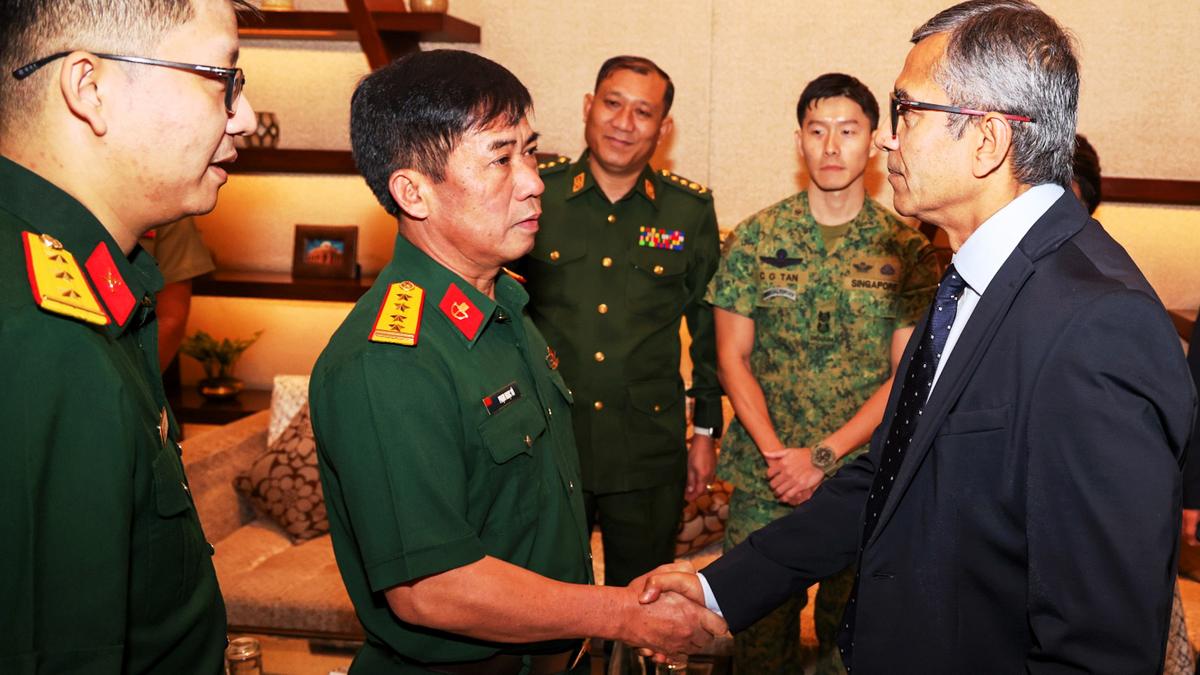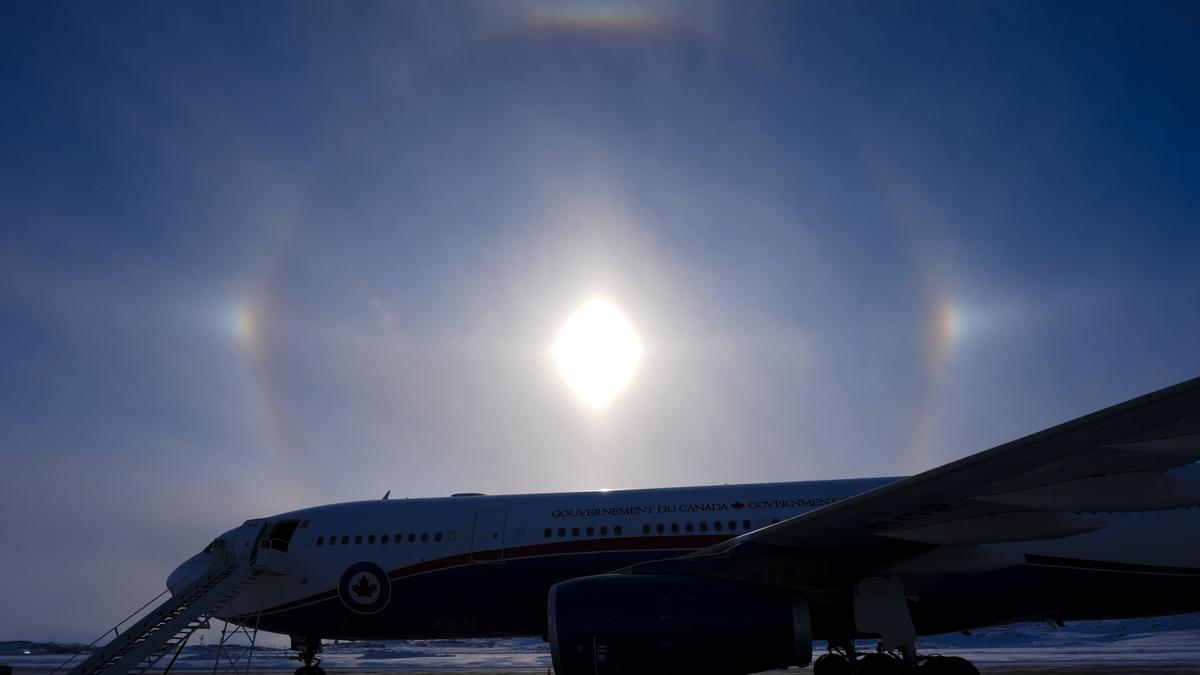India-ASEAN and EU Cooperation on Counter-Terrorism

- 23 Mar 2025
In News:
- 14th ASEAN Defence Ministers’ Meeting-Plus (ADMM-Plus) Experts’ Working Group on Counter-Terrorism (EWG on CT) was held in New Delhi.
- India and Malaysia took over as co-chairs for the 2024–2027 cycle, succeeding Myanmar and Russia (2021–2024).
- Two major exercises were announced:
- Table-top Exercise in Malaysia – 2026
- Field Training Exercise in India – 2027
- These are part of the EWG on CT 2024–2027 Work Plan.
Purpose and Agenda:
- To devise a comprehensive and coordinated counter-terrorism strategy.
- To share on-ground experiences of ASEAN and partner nations’ defence forces.
- Focus on evolving threats like violent extremism, radicalisation, and terrorism financing.
Participants in ADMM-Plus EWG on CT:
- ASEAN Member States: Indonesia, Malaysia, Philippines, Singapore, Thailand, Brunei, Vietnam, Laos, Myanmar, Cambodia.
- Dialogue Partners: India, China, U.S., Russia, Japan, South Korea, Australia.
- ASEAN Secretariat also participated.
India-EU Counterterrorism Engagement:
- On the sidelines of the Raisina Dialogue, the European Union (EU) conducted a technical workshop in New Delhi on preventing and countering violent extremism.
- Organized with the Embassy of the Netherlands and attended by security experts from EU states like Belgium, Bulgaria, Germany, and the Netherlands, as well as the Strong Cities Network (SCN).
- Discussions focused on:
- De-radicalisation strategies
- Rehabilitation of extremists
- Whole-of-government approaches
- Risk evaluation and reintegration
- Reinforced the India-EU commitment made during the EU College of Commissioners' visit to India and in the Joint Leaders' Statement.
About ASEAN:
- Established: August 8, 1967 (Bangkok Declaration)
- Headquarters: Jakarta, Indonesia
- Motto: "One Vision, One Identity, One Community"
- Members (10):
- Founding (1967): Indonesia, Malaysia, Philippines, Singapore, Thailand
- Later: Brunei (1984), Vietnam (1995), Laos & Myanmar (1997), Cambodia (1999)
- Population: ~662 million (2022)
- Combined GDP: $3.2 trillion (2022)
ASEAN Institutional Mechanisms:
- ASEAN Summit – Annual heads-of-state meeting.
- ASEAN Coordinating Council (ACC) – Implements decisions and agreements.
- ASEAN Regional Forum (ARF) – India joined in 1996; focuses on regional security dialogue.
- ASEAN Secretariat – Administrative support to ASEAN initiatives.
India-ASEAN Relations:
- Sectoral Dialogue Partner since 1992; Full Dialogue Partner since 1996.
- India-ASEAN FTA:
- Goods (2009)
- Services & Investments (2014)
- Strategic Partnership: Established in 2012.
- India in ADMM-Plus: Actively participates in defence and security cooperation mechanisms.
- ASEAN Future Forum: Proposed by Vietnam (2023); India is a founding member.
2030 Global Forest Vision (GFV)
- 23 Mar 2025
In News:
The 2030 Global Forest Vision (GFV), released in March 2025 by the Forest Declaration Assessment (FDA), outlines priority actions for governments to reverse forest loss and align environmental and trade policies ahead of UNFCCC COP30 (November 2025).
Background:
- The Forest Declaration Assessment (FDA) was established in 2015 to monitor progress on the New York Declaration on Forests (NYDF), a voluntary pact launched in 2014.
- NYDF includes 10 goals aimed at halting deforestation by 2030 and is supported by governments, corporations, indigenous groups, and civil society.
- India is not a signatory to the NYDF as of 2025.
Current State of Forests (Key Data):
- Despite commitments from 140 countries, 6.37 million hectares of forests were lost in 2023.
- Major drivers of deforestation:
- Agricultural demand for palm oil, soy, beef, and timber.
- 80% of Amazon deforestation is due to cattle ranching.
- 800+ million trees lost between 2017–2022 to meet Brazilian beef exports.
- In Indonesia and Malaysia, palm oil expansion threatens orangutans and Sumatran tigers.
Eight Priority Actions for Governments (GFV 2025):
- Ambition:Integrate forest conservation into national climate and biodiversity plans and COP30 commitments.
- Trade:Ensure legal, deforestation-free, and degradation-free trade through international partnerships.
- Finance:Scale up results-based payments and forest carbon credit systems, as agreed in the 2024 Forest & Climate Leaders’ Statement.
- Rights:Secure land rights of Indigenous Peoples (IPs) and Local Communities (LCs) to protect traditional forest stewardship.
- Supervision:Mandate financial institutions to assess and manage forest-related risks.
- Subsidies:Repurpose harmful subsidies to support sustainable food systems, bioeconomy, and forest management.
- Governance:Align land-use sector governance with global forest and climate commitments.
- Debt Flexibility:Recognize forests as natural capital in debt management to enhance fiscal space for forest-rich countries.
Global and Regional Efforts:
- EU Deforestation Regulation (2026):Bans imports linked to deforestation; companies must ensure supply chain transparency.
- U.S. Initiatives:Stricter laws against illegal logging and deforestation-linked imports.
- Challenges:
- China and India have not implemented deforestation-free trade regulations.
- Smallholder farmers lack the resources to certify products as deforestation-free.
- Developing nations (Brazil, Indonesia, African countries) express concerns over economic impacts of stricter trade rules.
Recommendations by GFV 2025:
- Tighten Global Trade Policies:Prevent companies from rerouting products to markets with weak regulations.
- Adopt Deforestation-Free Trade Laws:India, China, and other major economies urged to enact such policies.
- Support Local Economies:Provide technical and financial support to farmers for sustainable practices.
- Enhance Global Monitoring:Improve tracking systems for forest-linked commodities and promote global cooperation.
Kerala Establish Senior Citizens Commission
- 23 Mar 2025
In News:
In a landmark move, Kerala has become the first state in India to pass legislation creating a Senior Citizens Commission, with the passing of the Kerala State Senior Citizens Commission Bill, 2025.
Background: Rising Elderly Population in Kerala
- Kerala is witnessing rapid population ageing, outpacing national trends.
- Elderly (60+) as % of total population:
- 1961: 5.1% (Kerala) vs. 5.6% (India)
- 2001: 10.5% (Kerala) vs. 7.5% (India)
- 2015: 13.1% (Kerala) vs. 8.3% (India)
- Current elderly population: Approximately 4.8 million, expected to rise to 8.4 million by 2036.
- Key issues: neglect, abuse, financial insecurity, and loneliness.
Senior Citizens Commission: Key Highlights
- Statutory body under the Kerala State Senior Citizens Commission Act, 2025.
- Objective: Protection, welfare, rehabilitation, and empowerment of senior citizens.
- Will act as an independent authority with powers similar to a civil court.
Structure:
- Chairperson (status of Govt. Secretary) and three members (all senior citizens).
- Composition includes at least one woman and one member from SC/ST communities.
- Term: 3 years.
- Experts may be invited as special invitees (no voting rights).
Core Functions and Responsibilities:
- Policy Advisory:
- Recommends policies for elderly welfare.
- Aligns with national goals, such as the Maintenance and Welfare of Parents and Senior Citizens Act, 2007.
- Legal and Grievance Redressal:
- Investigates complaints of abuse, neglect, or exploitation.
- Can summon individuals, record evidence, and recommend protective actions.
- Healthcare and Mental Well-being:
- Promotes geriatric care, regular health check-ups, and mental health support.
- Addresses loneliness, depression, and social isolation.
- Social Inclusion and Engagement:
- Encourages intergenerational bonding and community programs.
- Utilizes skills and experience of the elderly for social and community development.
- Financial Security Support:Aids in accessing pensions, social security schemes, and financial counselling.
- Monitoring and Reporting:
- Submits periodic reports to the state government.
- Makes recommendations for policy improvement and conflict resolution.
- Custodial Oversight:Addresses issues related to elderly detainees in prisons and lock-ups.
Budget and Administrative Details:
- Annual expenditure: Approx. ?1 crore (salaries, allowances, operations).
- One-time setup cost: ?9 lakh from the Consolidated Fund of the State of Kerala.
Significance:
- First such commission in India, fulfilling recommendations under the National Policy on Senior Citizens, 2011.
- Aims to serve as a model for other Indian states facing similar demographic shifts.
- Reinforces Kerala’s leadership in elderly welfare policies.
GPS Interference and Spoofing in Indian Airspace

- 23 Mar 2025
In News:
Between November 2023 and February 2025, 465 incidents of GPS interference and spoofing were reported, predominantly in the Amritsar and Jammu border regions. This was disclosed by Minister of State for Civil Aviation MurlidharMohol in a written reply to the Lok Sabha.
What is GPS/GNSS Spoofing?
- GPS (Global Positioning System) and GNSS (Global Navigation Satellite System) spoofing involves broadcasting false GPS signals that deceive receivers into calculating incorrect locations.
- It is a form of cyberattack exploiting weak satellite signal strength to override legitimate GPS data.
- It can mislead aircraft navigation systems, creating flight safety risks in sensitive regions like international borders.
How GPS Spoofing Works:
- GPS satellites transmit weak signals to Earth.
- Spoofers broadcast stronger fake signals mimicking these satellites.
- Receivers (like those in aircraft) pick up false data, resulting in mislocation or navigation errors.
Types of Spoofing Attacks:
- GPS Spoofing – False location data.
- IP Spoofing – Hides origin of data, often used in DDoS attacks.
- SMS/Caller ID Spoofing – Disguises identity to deceive users.
Government Response:
DGCA Circular (Nov 2023):
- Mandated reporting of GPS interference.
- Issued mitigation guidelines for:
- Aircraft operators
- Pilots
- Air Traffic Controllers
- Air Navigation Service Providers (ANSP)
Use of International Best Practices:
- Guidelines align with ICAO and EASA standards.
- NOTAMs (Notice to Airmen) are issued in affected areas.
- Airlines implement Standard Operating Procedures (SOPs) to manage spoofing incidents.
Navigation Redundancy Measures:
- Retention of ground-based navigation systems as backups.
- Ensures continued navigation in the event of GPS disruption.
Role of AAI (Airports Authority of India):
- Sole Air Navigation Service Provider (ANSP) in India.
- Continuously upgrading air navigation infrastructure to counter emerging threats like spoofing.
World Happiness Report 2025
- 23 Mar 2025
In News:
The World Happiness Report (WHR) 2025 was released on 20th March (World Happiness Day) by the Wellbeing Research Centre at the University of Oxford, in collaboration with Gallup and the UN Sustainable Development Solutions Network (UNSDSN).
India’s Performance:
- India’s Rank (2025):118th out of 147 countries (Improved from 126th in 2024).
- Sub-Indicator Performance:
- Donations: 57th
- Volunteering: 10th
- Helping a Stranger: 74th
- Wallet Return Probability:
- 115th (by neighbor)
- 86th (by stranger)
- 93rd (by police)
- Sub-Indicator Performance:
- Happiness Score: Increased from 4.054 (2021–23) to 4.389 (2022–24).
- Rank among Neighbors:
- Nepal: 92nd
- Pakistan: 109th
- Myanmar: 126th
- Sri Lanka: 133rd
- Bangladesh: 134th
Top 10 Happiest Countries (2025):
- Finland (8th consecutive year)
- Denmark
- Iceland
- Sweden
- Israel
- Costa Rica (new entrant)
- Netherlands
- Norway
- Luxembourg
- Mexico(new entrant)
Least Happy Countries (Bottom 5):
- 147th: Afghanistan (4th consecutive year as lowest)
- 146th: Sierra Leone
- 145th: Lebanon
- 144th: Malawi
- 143rd: Zimbabwe
About the Report:
- Purpose: Measures global well-being through life evaluations and promotes policy focus on happiness, mental health, and quality of life over mere economic growth.
- Methodology:
- Based on Gallup World Poll (2022–2024 data).
- Uses Cantril Ladder Scale (0–10) for life evaluation.
- Six Key Indicators:
- GDP per capita
- Healthy life expectancy
- Social support
- Freedom to make life choices
- Generosity
- Perception of corruption
Global Trends in Happiness (2025):
- Nordic Dominance: Finland, Denmark, Iceland, and Sweden occupy top ranks.
- Decline in Western Countries:
- USA: 24th (down from 11th in 2012)
- UK: 23rd (lowest since 2017)
- Rising loneliness and social isolation major causes.
- Israel (5th): Maintained high rank despite ongoing conflict.
- Social Support Decline: 19% of young adults globally report having no one to rely on.
Special Focus: India vs Pakistan – The Paradox
Despite India’s:
- Higher GDP per capita ($2,480.8 vs Pakistan’s $1,365.3),
- Better health indicators (life expectancy: 58.1 vs 56.9),
- Better corruption perception rank (India: 96th, Pakistan: 135th),
India still ranks lower in happiness.
Reason: Low scores in perceived freedom and individual life satisfaction.
World Happiness Day:
- Observed on: 20th March
- Initiated by: Bhutan, which pioneered the concept of Gross National Happiness (GNH).
- Adopted by UNGA: July 2012
- Theme 2025:"Caring and Sharing"
